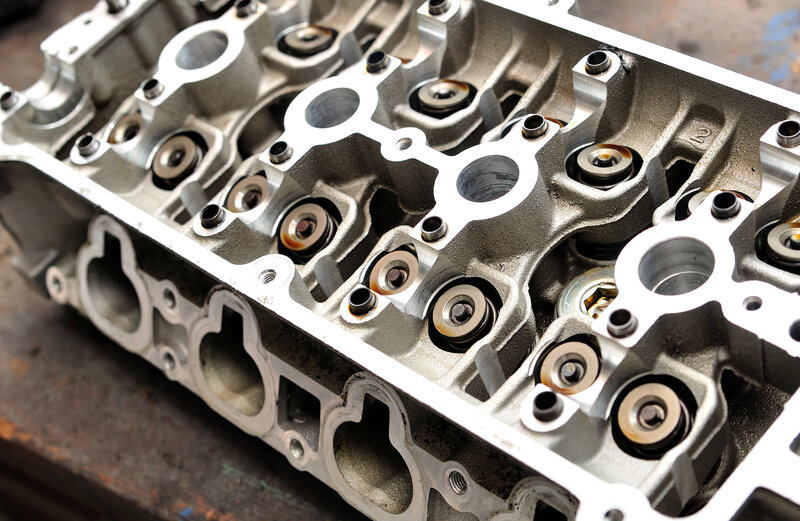
Engine problems can quickly go from requiring a small repair to more serious problems like overheating or even exploding. When you know how to recognize signs of cylinder head deterioration, you and your mechanic can determine it's time for a replacement.
When you need engine repair, our qualified mechanics at All Bay Diesel can bring our mobile diesel repair service to you anywhere in the San Francisco Bay Area.
Contact us at 925-522-1780 and schedule an appointment with our expert team.
If you have not yet faced the cost of cylinder head replacement, consider yourself lucky. The cylinder head is essentially the top (or the head) of your engine. The cylinder head sits on the body of the engine, called the engine block.
Diesel fuel flows through the cylinder head. Coolant also circulates in the combustion head, preventing your vehicle from overheating.
When your cylinder head becomes damaged, you will see sure signs. Your vehicle won’t deliver the reliable performance it once did. The engine may overheat with growing frequency, or you may have to replenish the oil more regularly.
Due to the wear and tear that comes with the typical use of a diesel engine, a cylinder head typically functions at full capacity for about five years. A cylinder head can last several years longer if your engine is well-maintained and if you know what to look for when it comes to signs of deterioration.
It’s never good when your engine starts smoking. If white smoke starts coming from your engine, take note right away. It is a sign that the engine coolant and the oil have mixed.
While this is relatively uncommon, it is still a possibility. Don’t ignore the white smoke coming from your engine. It could result in complete engine failure.
When the valve heads reach the end of their life and can no longer form a tight seal, the combustion chamber is not able to operate with enough pressure to maintain the expected gas mileage. Take note of your typical refueling routine. If you notice you have to refuel more often to maintain your daily mileage, you may need to have a professional mechanic inspect your cylinder head.
There are other causes of increased fuel consumption. If a professional mechanic inspects your cylinder head and determines it is not the cause of your vehicle’s increased fuel consumption, there could be another way to increase fuel inefficiency.
As your engine runs, it creates a great deal of heat. While high temperatures occur in all motors, it means your cylinder head goes through a constant cycle of rising to a high temperature and then falling back down to a cooler temperature. Over time, the perpetual expansion and contraction of the metal form cracks in the cylinder head.
If your vehicle overheats, your cylinder head could have sustained a fracture. Schedule an inspection with a professional mechanic to find out if repair is possible.
Much like the increased need for fuel, when the valves can no longer form an optimal seal, the engine will require oil more often than is normal. A reduced oil level means oil is able to leak into places within the engine where it shouldn’t be, such as the exhaust port or the intake port.
Your cylinder head won’t last forever, but you can take measures to extend its life. When you actively look for engine damage, you can avoid the cost of major repairs.
Your truck’s manual will indicate how often a mechanic should inspect your vehicle. It is important to follow those guidelines. However, you can and should have your vehicle serviced more often to proactively avoid significant repair costs.
Look at the ground underneath your typical parking spot. If you see unusual leakage of oil, coolant, or even fuel, contact a professional for an assessment.
When you know an engine part has sustained damage, don’t wait until it becomes completely incapacitated before having a mechanic replace the part. Replacing parts as soon as they begin to malfunction will extend the life of your engine.
Knowing the signs of damage and when to replace worn parts will extend the life of your cylinder head. It will also help you anticipate a replacement timeline for your cylinder head. Knowing the time is coming for a cylinder head replacement will allow you to budget and keep you from getting slapped with an unexpected bill.
When you experience engine trouble, let a qualified mechanic inspect your vehicle right away. If the mechanic determines replacement is necessary, you have a couple of different options to consider.
If the sudden cost of cylinder head replacement sends you reeling, a rebuilt cylinder head could be the best option. Certified mechanics inspect a used cylinder head and replace any necessary parts.
When it comes to vehicle repair, you get what you pay for, and this instance is no different. A rebuilt cylinder head will last around 300,000 miles before you will once again face engine trouble.
A remanufactured cylinder head is the best replacement option all around. Every part on a remanufactured cylinder head is new, and each cylinder head undergoes comprehensive testing during the remanufacturing process to ensure it is as close to a new cylinder head as possible.
Remanufactured cylinder heads are more expensive due to their containing all new parts. The upside to a remanufactured cylinder head is that you will be able to use it much longer than a rebuilt cylinder head, saving money in the long run.
If your vehicle needs a cylinder head replacement or if you would like to consult a qualified mechanic about an additional diesel performance upgrade, contact our professionals at All Bay Diesel at 925-522-1780. We will bring our mobile repair services to you.